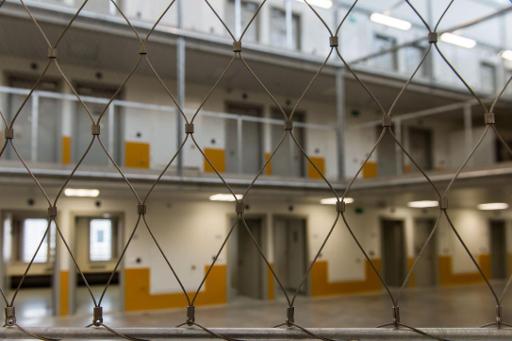Over the past few weeks we have seen several short articles published across Belgian media concerning the protest in prisons.
The articles frame prisoner dissent as a difficult and trying task for correctional officers to manage in the face of the global pandemic and threat that the virus presents to the ‘criminal justice’ system.
We currently have a unique opportunity to consider how vulnerable members of our community — local, regional, national and global — are disproportionately impacted by the virus and to demand an immediate response from our parliamentary representatives. We must question how systems and structures of governance and justice protect or neglect us.
In particular, we have an opportunity to advocate for reparative justice against racialized constructions of criminality, an over-populated prison system incarcerating citizens for extended periods of remand (that is, pre-trial prisoners) and prisons, more generally, as an effective means to ‘protect’ and ‘reform’.
Indeed Belgians of Moroccan descent are the most represented minority in detention, while prison occupancy levels sit at 120% capacity across Belgium. The failure to respond to calls for the protection of vulnerable members of the community would be to disregard the value of the human lives within these institutions.
Daily, prisoners are having their rights taken from them. In the Prison de Leuze, and across the country, prisoners no longer have access to visits; they no longer have access to the canteen that provides food in accordance with Islamic law; they no longer have access to the library, while recreational time is limited to one hour and in small groups; and the men are no longer allowed to receive care packages.
Their compensation for this reduction in liberty was a twenty-euro call credit. We sought clarification from the Minister of Justice, Koen Geens, about whether this was a 20 euro call credit to all prisons – that is, approximately 200 000 euro cost to the Belgian Federal Public Service for Justice that could have been used to install video-call facilities – or whether it was a corporate deal with a communications company. We received no response. Either way, the fallout of this is exposure to COVID-19 and severe mental health ramifications.
In the Prison of Saint Gilles in Belgium on Thursday 19 March, prisoners refused to return to their cells. The spokesperson for the General Directorate of Prison Administration Kathleen Van de Vijver stated that “It is heartbreaking to see that the detainees who are on the roof do not understand this situation. They therefore penalize the other detainees.”
This statement displays a shocking level of patronisation for the prisoners and a distinct disconnection from the realities of prison relations amongst detainees. Prisoners are perpetually dismissed as ‘not understanding,’ rather than being thoughtfully listened to.
Secondly, what is true of prison—survival becomes about the support systems built in the prison against all odds. Your cellmates become your family.
The prisoners who actively protested against these conditions in prison — remember that the majority of prisoners in Saint Gilles are on remand — are taking a stance against the violent lockdown in prisons across the country. This stance is supported by prisoners in Belgium.
A couple of days prior to the protests in Saint Gilles at the Prison de Nivelles prisoners refused to return to their cells. Only after the federal police were called for backup did they return. During the protest, prisoners who were not in the yard called messages of support from their windows that surround the recreational area.
Days after the protest in Nivelles at the Prison de Leuze, prisoners protested the deteriorating situation by staying in the yard. On March 25, again at the Prison de Leuze and in Arlon prisoners against protested for their rights.
Ms Van de Vijver’s statement represents the dishonourable position of the government towards prisoners. In her statement she articulates that the prisoners are not intelligent to understand their situation, and secondly, they are bringing any restrictions upon themselves.
Such patronising language should not be tolerated by official representatives. Prisons in Belgium have been condemned as ‘unhygienic and dilapidated’ by the European Court of Human Rights. Prisons in Belgium are in violation of Article 3 of the ECHR (prohibition of inhuman or degrading treatment). Rather than gaslight prisoners, Van de Vijver should address the very real situation for prisoners.
Prisoners are protesting access to food, to the library, to sport. With the suspension of visits, prisoners are at no risk of bringing in the virus, which would turn the prison into a death trap. Right now, the risk are the guards.
While Koen Geens announced on the 24th of March that guards will be wearing masks — which the Federal Public Service Justice promoted on their Facebook page as being fabricated by prisoners, with the hashtag #Cellmade—this is not enough. Prisons urgently need to be depopulated. Children need to be released from detention. It is time to change direction in how we as a society see reform and address the core issues in our society—starting with poverty and racial profiling.
Criminal lawyer Olivier Martins has advocated the indefinite release of non-violent prisoners and emphasised the dire situation that will come in report with Les News 24 on the 24th of March. In the Prison of Saint Gilles prisoners have access to the showers two times per week—this is before COVID-19.
With rats and cockroaches infesting the prison, and with the prisoners two showers lessened again with the current health emergency, the situation will be catastrophic.
The current public health crisis that we face is unsettling. However, just has we have seen the rise of community support, we must not forget vulnerable members of our community. Prisoners are currently facing unprecedented violations.
The most appropriate measure to take by the Belgian Federal Public Service for Justice would be to commit to their promise to address the overpopulation and decrepit conditions in the nation’s prisons, only then might we restore faith in the genuinity of our official representatives.
By Suzannah Henty and Brianna Hoff


